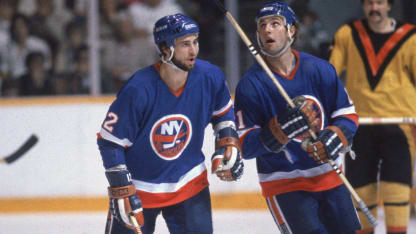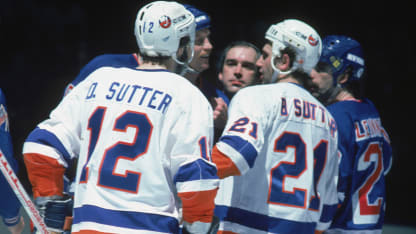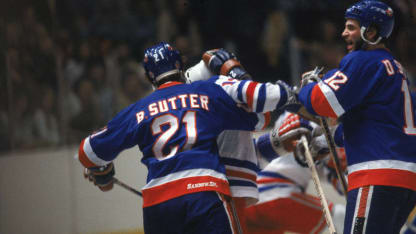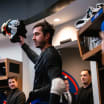Maven's Memories: The Sutter Brothers Road to the Islanders
From farm to Islanders, Duane and Brent Sutter's path from Alberta to Long Island

© B Bennett/Getty Images
Without fear of contradiction, I called them The Hustle Brothers. That's based on their collective contributions to four Stanley Cups and 19 consecutive playoff series victories.
Not to mention the oodles of thrills they delivered, over and over again.
"We were lucky to have not one but two guys from the Sutter family," said Jim Devellano, Bill Torrey's chief scout; now executive vice president of the Detroit Red Wings.
What's interesting to note is how Duane and Brent developed their heroic NHL images which originated in the tiny Alberta town called Viking, 90 miles east of Edmonton on Highway 14.
As Canadian families go, the Sutter clan could be called over-hockeyed.
It wasn't just Duane and Brent; they were aided, inspired and abetted by brothers Gary, Brian, Darryl, Rich and Ron. But, in this case, we're focusing only on the Islanders branch of bros.
MAVEN'S MEMORIES
WRITTEN COVERAGE
Kelly Hrudey Origins
How The Trio Grande Happened
Chico Resch's Unforgettable Game
Denis Potvin's Road to the Isles
Ziggy Palffy, Underrated Islanders Hero
Bill Torrey's Origin Story
The Heals and Flats Show
1993 Run Ends in Montreal
Unusual Draft of 1979
Maven's Haven
Their home town, Viking, was a typical hamlet on the Canadian prairie. It's traceable to the original route of the Canadian National Railway. In time that same CNR delivered wheat farmed by Louis and Grace Sutter.
"Farming always was a family endeavor for the Sutters," wrote Dean Spiros, author of Six Shooters -- Hockey's Sutter Brothers.
"When the Sutter boys weren't hard at work on the farm, they played just as hard. Baseball in the summer, football in the fall, and hockey whenever and wherever possible."
There was absolutely nothing easy about farm life but Louis and Grace Sutter had a "grin-and-bear it" philosophy which they successfully passed on to their kids.
Exhibit A was their living quarters in the farmhouse. Altogether there were nine Sutters -- Gary was the seventh boy -- who shared a house with only a kitchen, living room and two small bedrooms.
It was no fun having to use an outhouse on cold winter nights nor having to draw water from a hard-water well. The boy's "bathtub" was nothing more than a galvanized washtub.
To produce a hot bath in winter, Louis would melt snow on the family's pot-bellied stove. Then, dad would pour it into the makeshift bathtub.
Grace told Dean Spiros: "If a couple of the boys had to use the same water, they always seemed to understand. When we finally moved to a house that had running water, the boys must've taken five baths a day."
The hardships were balanced with easier work. Grace supplied endless vegetables from her garden. On the side she did canning. Aside from the produce the Sutter's cultivated, there was the livestock.
Farm animals included an endless head of pigs and more than a dozen cows. The boys would do the milking when Grace was tied up with other morning chores.
"Dad wasn't going to let us just sit around," Brent explained. "We had to chip and do plenty of the work."
By 1967, the Sutter's had enough resources to move to a larger farm. Here again, Brent and Duane helped clear the heavily-wooded land so that crops could be harvested without damage to the machinery.
To become proficient at hockey Duane and Brent needed ice and that's where they were lucky. Their home was in Beaver County and, as it happened, the county's only indoor rink was housed in Viking.
It was nicknamed the "Carena" because in 1949 some 50 grand was raised by raffling off one automobile a month for two years. The ice was natural, which meant that the boys hoped for freezing temperatures.

© B Bennett/Getty Images
Duane and Brent also played road hockey and found a stickhandling haven in the barn's big hayloft which they re-named "The Arena." And it worked for yet another Sutter variation on hockey.
"They'd been eyeing the spacious loft with the hardwood floor," wrote Spiros, "and when they hooked a couple of lanterns up in the beams they knew they were on to something."
Duane, the first Sutter to become an Islander, got his nickname "Dog" long before he arrived in Uniondale. According to the Sutter biography it happened when a cousin visited with his pet poodle Goober.
Spiros: "The dog never stopped yapping and, finally, one of the boys remarked how the dog sounded a lot like Duane. Thus, Duane became known as 'Goober." Before long it was just plain 'Dog.'"
In time, all of the farm challenges and pastimes such as Loft Hockey shaped the character and skill of both Duane and Brent. Like their older brothers they eventually were invited to play for the Red Deer Rustlers.
One by one, the Sutter boys waved bye-bye to Grace and Louis, hoping to make their way up the hockey ladder. While mom shed the anticipated tears, first Gary, then Brian and Darryl headed to Red Deer.
No farm town, Red Deer was a community (then) of 35,000 citizens boasting an arena with artificial ice, the better for its Tier II team to skate on and, hopefully, win championships.
Duane was a big help to the Rustlers. "His tenacity, combined with ability was one of the things that grabbed my attention," said Isles chief birddog Devellano. "It was obvious that this was yet another special Sutter."
So impressive was Duane with Tier II Red Deer that he was promoted for a game with the Western Canada (Junior A) Hockey League's Lethbridge Broncos during the 1976-77 season.
He exited with one assist and a minor penalty. That was good enough for the Broncos to bring Duane back for eight playoff games.
In his second Tier II season, (1977-78) Duane flowered as a star. He totaled 100 points (47-53) over 59 games and once again, was promoted to Lethbridge; this time to stay.
The Islanders picked Duane in the first round of the 1979 Entry Draft (17th overall) and never regretted the decision.
Devellano: "By Duane's last year in Lethbridge (1979-80) we knew it was time to give him a shot with the big team. After 21 games with the Broncos, we brought him to the Island."
Duane never looked back; didn't have to as he proved not only to be a solid freshman but a key cog in the Isles march to their first Stanley Cup.

© B Bennett/Getty Images
Meanwhile, Brent had graduated to the Rustlers to the great joy of coach John Chapman. He knew he had a winner in Brent.
Chapman: "We had a team with an average age of less than 17 years during a time when Tier II teams could carry a full squad of 20-year-olds.
"Brent was 17 years old and our captain. But he helped us get the job done. We played our 100th game the night we won the (1980) Centennial Cup. We lost only 13."
Spiros: "Brent was Red Deer's leader, and he proved it in the championship game against North York. Playing with a painful charley horse, he scored the tying and winning goals in a 3-2 victory."
From their Coliseum offices, the Islanders high command had been tracing Brent's arresting feats as if he was under an electron microscope.
"At the time," remarked Torrey, "it was unheard of to draft a kid from Tier II in the first round. But we believed that Brent was exceptional enough to take that chance. We picked him 17th overall.
"I have to say we never had any regrets about it. All you have to do is see how much Brent -- and, of course, Duane -- did for us."
Duane skated on all four Islanders Cup-winners; Brent on the final two. Eventually, his leadership qualities earned Brent the Isles captaincy.
Writing in his definitive book, Players, historian Andrew Podnieks reported that Brent displayed the same fortitude in the NHL that he had on the farm.
"Brent hated to lose," Podnieks concluded. "Like Duane, he worked hard for every shift and for every inch of the ice. He was tough and skilled plus he'd play through pain that would hospitalize most men."
Bottom Line: What Duane and Brent brought to the champion Islanders was precisely what they developed in their origins.
Hustle!
(P.S. Thanks to author-historian Dean Spiros and his definitive biography of the Sutter Brothers, "Six Shooters." Without it, this piece could not have been written.)


















